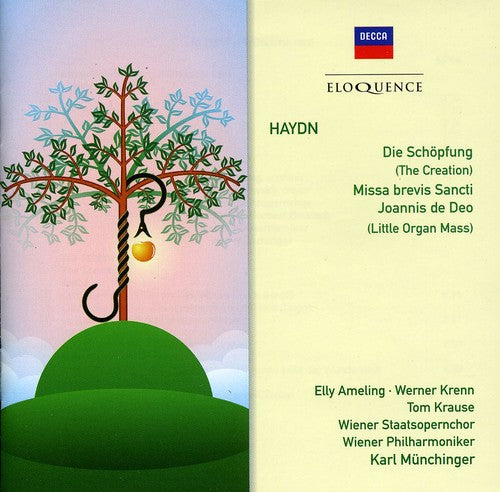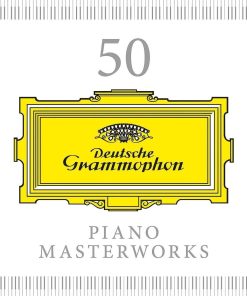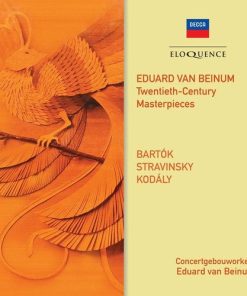HAYDN: THE CREATION; MISSA BREVIS “LITTLE ORGAN MASS” – MUNCHINGER, AMELING, VIENNA PHILHARMONIC (2 CDS) DECCA
$ 16,99 $ 10,19

Haydn: Mass, Hob. XXII: 7 in B flat major ‘Kleine Orgelmesse’
Elly Ameling (soprano)
Wiener Staatsoper, Wiener Philharmoniker
Karl Münchinger
Haydn: The Creation (Die Schöpfung), H.XI / II / Part 1 (Sung in German)
Elly Ameling (soprano), Werner Krenn (tenor), Tom Krause (baritone)
Wiener Philharmoniker, Wiener Staatsoper
Karl Münchinger
The Creation is Haydn’s masterpiece, based on a lifetime of experience and reflecting the happy confidence of the eighteenth century. Although there are moments that presage the nineteenth century, it has none of the agonizing of the Romantic period. Three years from the end of the eighteenth century it is a summation and celebration of that century’s ideals by one of it’s greatest figures. The story is unfolded by three soloists, whose names, taken from Milton, were supplied by the Baron Van Swieten: Gabriel (soprano), Uriel (tenor) and Raphael (bass). Haydn’s Missa brevis Sancti Joannis de Deo is a short mass in the Viennese tradition, although it is thought that it was composed for the Convent Chapel of the Eisenstadt Chapter Haydn’s Missa brevis Sancti Joannis de Deo is a short mass in the Viennese tradition, although it is thought that it was composed for the Convent Chapel of the Eisenstadt Chapter of the Brothers of Mercy (Barmherzige Br der), with which order Haydn had long been.

A splendid recording. Chorus and orchestra both sound large, which is what Haydn wanted, and both are in superb form, while the soloists are as good as in any other version and better than most. […]The playing of the Vienna Philharmonic Orchestra is superlative. This music is in their blood and no praise can be too high for the glorious playing they give us all through … Tom Krause has never done anything so good as this … Werner Krenn is a most sensitive and poetic Uriel. He has a voice of beautiful lyrical quality, and phrases most musically. … Fresh and youthful also is Elly Ameling’s beautifully sung Gabriel. … The Vienna State Opera Chorus sing superbly and with admirable enunciation of the words, and the balance of parts is excellent. They are obviously as much in love with their task as the rest. The highest praise must go to Münchinger for his inspired direction of the score. – GRAMOPHONE
Fast Shipping and Professional Packing
Due to our longstanding partnership with UPS FedEx DHL and other leading international carriers, we are able to provide a range of shipping options. Our warehouse staff are highly trained to pack your goods exactly according to the specifications that we supply. Your goods will undergo a thorough examination and will be safely packaged prior to being sent out. Everyday we deliver hundreds of packages to our customers from all over the world. This is an indication of our dedication to being the largest online retailer worldwide. Warehouses and distribution centers can be located in Europe as well as the USA.
Orders with more than 1 item are assigned processing periods for each item.
Before shipment, all ordered products will be thoroughly inspected. Today, most orders will be shipped within 48 hours. The estimated delivery time is between 3-7 days.
Returns
The stock is constantly changing. It's not entirely managed by us since we are involved with multiple parties such as the factory and our storage. The actual stock can fluctuate at any time. Please understand it may happen that your order will be out of stock when the order is placed.
Our policy is valid for 30 days. If you haven't received your product within 30 days, we're not able to issue either a return or exchange.
You are able to return a product if it is unused and in the same condition when you received it. It must also still remain in the original packaging.

























































